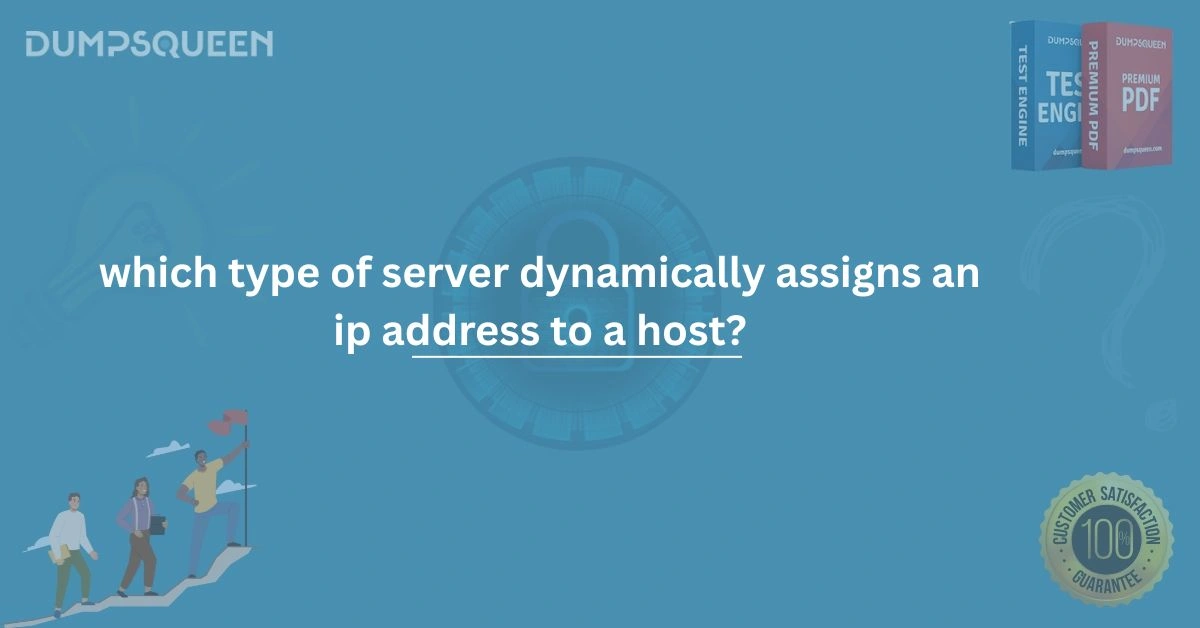Introduction
In the ever-evolving landscape of modern networking, the ability to manage IP address allocation efficiently is crucial. Networks consist of multiple devices such as computers, smartphones, printers, and servers, all of which require unique IP addresses to communicate over the internet or a local network. One of the core technologies that automates this process is a specific type of server designed to dynamically assign IP addresses to hosts within a network. But which type of server dynamically assigns an IP address to a host? The answer lies at the heart of dynamic networking principles and is a key topic covered in many networking certification exams offered on DumpsQueen. In this comprehensive blog, we will explore the role of dynamic IP address assignment in networking, understand the mechanism and benefits of using such a server, and highlight how this knowledge is vital for certifications like CompTIA Network+, Cisco CCNA, and others. We will also include a few multiple-choice questions (MCQs) to give you a flavor of the kind of questions you might see in the actual certification exams. Whether you're a student, a network technician, or preparing for your next IT certification with the help of DumpsQueen, this guide is tailored for you.
Understanding IP Address Allocation
Every device connected to a network needs an Internet Protocol (IP) address to identify itself and communicate with other devices. An IP address is a numerical label assigned to each device, enabling the exchange of data packets in both private and public networks. There are two primary methods to assign IP addresses to devices:
-
Static IP Addressing – where the address is manually configured by a network administrator.
-
Dynamic IP Addressing – where the address is assigned automatically by a server when the device joins the network.
Static addressing is still used in specific scenarios, especially for servers, routers, or devices that need a permanent address. However, in large networks with hundreds or thousands of devices, manually assigning IP addresses becomes cumbersome, time-consuming, and error-prone. This is where dynamic allocation becomes essential.
What Is Dynamic IP Addressing?
Dynamic IP addressing refers to the automatic assignment of an IP address to a device from a predefined pool of addresses. This method allows devices to join and leave the network without requiring manual configuration each time. The dynamic assignment is temporary and typically comes with a lease time. Once the lease expires, the address can be renewed or reassigned. This form of automation dramatically simplifies network administration, particularly in environments like enterprises, universities, or public Wi-Fi networks where devices frequently connect and disconnect. So, which type of server dynamically assigns an IP address to a host? The answer is the DHCP Server.
What Is a DHCP Server?
DHCP (Dynamic Host Configuration Protocol) server is the specific type of server that dynamically assigns IP addresses to hosts on a network. When a device connects to a network, it sends a request looking for a DHCP server. The DHCP server then responds by allocating an available IP address from its pool, along with other configuration information like subnet mask, default gateway, and DNS servers. DHCP operates based on a client-server model. The host acts as a client, sending a DHCP discovery broadcast on the network, and the server replies with an offer. Once the offer is accepted, the IP address is leased to the host for a specific period. This process is automatic, transparent to the end user, and essential for ensuring efficient and conflict-free IP address allocation in medium to large networks.
DHCP in the OSI Model
DHCP functions at the Application Layer (Layer 7) of the OSI model, even though it is deeply involved with IP addressing, which is primarily associated with Layer 3 (Network Layer). As an application protocol, DHCP runs over UDP (User Datagram Protocol), which operates at the Transport Layer.
The key port numbers associated with DHCP are:
-
UDP Port 67 for server communication
-
UDP Port 68 for client communication
Understanding where DHCP operates within the OSI model is vital for students preparing for exams like Cisco CCNA or CompTIA Network+. DumpsQueen offers detailed and updated dumps for these certifications that cover this topic extensively.
How DHCP Works: The DORA Process
DHCP follows a specific sequence of steps commonly known as DORA:
-
Discover – The client broadcasts a DHCP discover message.
-
Offer – The DHCP server replies with an IP address offer.
-
Request – The client accepts the offer and sends a request message.
-
Acknowledgment – The DHCP server confirms the lease and assigns the IP.
This four-step process ensures the host receives an IP address along with necessary network configuration details. If the lease expires, the process is repeated to renew or reassign the IP.
Benefits of Using a DHCP Server
The primary benefit of DHCP is automation, but it offers several advantages beyond that:
-
Efficiency: No need for manual IP configuration for each device.
-
Scalability: Easily supports large and dynamic networks.
-
Accuracy: Reduces errors like duplicate IPs and misconfigurations.
-
Centralized Management: Network administrators can control all IP address settings from one location.
-
Flexibility: Devices can move across networks and always receive proper configuration without intervention.
Organizations that rely on constant connectivity and device management such as schools, hospitals, enterprises, and ISPs heavily depend on DHCP for smooth operations.
DHCP vs Static IP Allocation: When to Use Each?
While DHCP is suitable for most end-user devices and dynamic environments, static IPs are still used in situations where stability and consistency are paramount. Devices like web servers, mail servers, and routers often use static IP addresses to ensure they are always reachable at the same address. On the other hand, DHCP is the best choice for client computers, mobile devices, or any device that doesn’t require a permanent IP address.In exam scenarios, understanding the use cases for each type is important. The DumpsQueen platform often includes exam practice questions where candidates need to differentiate between static and dynamic addressing.
Security Considerations with DHCP
Although DHCP simplifies IP management, it also introduces some security challenges. For example, rogue DHCP servers can be set up in a network, potentially causing clients to receive incorrect IP configuration, leading to loss of connectivity or man-in-the-middle attacks. To counter this, network administrators implement security mechanisms such as:
-
DHCP Snooping – Allows switches to filter DHCP messages and prevent rogue servers.
-
IP Source Guard – Works with DHCP snooping to prevent spoofing.
-
Port Security – Restricts the number of MAC addresses per switch port.
These security layers are part of advanced networking topics often included in CCNA and Security+ certifications, both of which are covered with real exam dumps on DumpsQueen.
DHCP Configuration on Routers and Servers
On enterprise networks, DHCP is usually configured on dedicated DHCP servers or integrated into routers and layer-3 switches. Common operating systems like Windows Server and Linux can also be used to set up a DHCP service.
A typical configuration includes:
-
Defining the IP address range (scope)
-
Setting lease duration
-
Specifying options like DNS servers and default gateways
-
Enabling logging for auditing
Understanding DHCP configuration is crucial for system and network administrators and is a core lab objective in many certification programs.
Real-World Application of DHCP
In real-world environments, DHCP is not just a theoretical concept but a backbone of network communication. Every time you connect to Wi-Fi at a coffee shop, or plug your laptop into an office network, a DHCP server assigns your device an IP address instantly. The same process occurs in data centers, virtual environments, and enterprise infrastructures. Mastering DHCP, its configurations, and its role in networking ensures you are prepared for both hands-on tasks and theoretical exams.
Certification Relevance and DumpsQueen Advantage
If you're preparing for certifications such as:
-
CompTIA Network+ (N10-008)
-
Cisco CCNA (200-301)
-
Microsoft Azure Administrator (AZ-104)
you will encounter questions like “Which type of server dynamically assigns an IP address to a host?” and will need to understand DHCP inside and out. DumpsQueen offers high-quality, up-to-date exam dumps, practice questions, and study materials that ensure your success on the first attempt. The DumpsQueen team continuously updates its materials to align with real-world exams, helping thousands of candidates earn their certifications with confidence. If DHCP and IP addressing is on your exam outline, trust DumpsQueen to prepare you.
Free Sample Questions
Question 1: Which type of server dynamically assigns an IP address to a host?
A. DNS Server
B. FTP Server
C. DHCP Server
D. Web Server
Correct Answer: C. DHCP Server
Question 2: Which protocol is used by a DHCP server to communicate with clients?
A. TCP
B. UDP
C. ICMP
D. ARP
Correct Answer: B. UDP
Question 3: At which OSI layer does the DHCP protocol operate?
A. Layer 2 - Data Link
B. Layer 3 - Network
C. Layer 4 - Transport
D. Layer 7 - Application
Correct Answer: D. Layer 7 - Application
Question 4: What is the first step in the DHCP process when a client joins a network?
A. Offer
B. Request
C. Acknowledge
D. Discover
Correct Answer: D. Discover
Conclusion
In summary, the server that dynamically assigns an IP address to a host is known as a DHCP server. Its role in modern networking is essential, automating IP address allocation and making large-scale network management practical and efficient. DHCP operates at the Application Layer, uses UDP for transport, and ensures hosts get all the necessary network configuration information without manual input. Understanding the function and importance of DHCP is crucial not only for hands-on IT work but also for passing industry-recognized certifications. If you're preparing for exams like Cisco CCNA or CompTIA Network+, mastering this topic is a must. And there's no better place to do that than DumpsQueen, your reliable source for updated exam questions and preparation materials. So, the next time you ask, "which type of server dynamically assigns an IP address to a host?" remember, the answer is DHCP server, and your best resource for mastering it is DumpsQueen.




